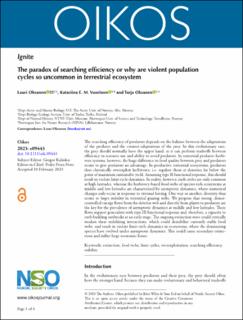The paradox of searching efficiency or why are violent population cycles so uncommon in terrestrial ecosystem
Peer reviewed, Journal article
Published version

View/
Date
2023Metadata
Show full item recordCollections
- Publikasjoner fra CRIStin - NINA [2397]
- Scientific publications [1423]
Original version
10.1111/oik.09443Abstract
The searching efficiency of predators depends on the balance between the adaptations of the predator and the counter-adaptations of the prey. In this evolutionary race, the prey should normally have the upper hand, as it can perform tradeoffs between efficiency in resource use and ability to avoid predators. In terrestrial predator–herbi-vore systems, however, the huge difference in food quality between prey and predators seems to give predators an advantage. In productive terrestrial ecosystems, predators thus chronically overexploit herbivores, i.e. regulate them at densities far below the point of maximum sustainable yield. Assuming type II functional response, this should result in violent limit cycle dynamics. In reality, however, such cycles are only common at high latitudes, whereas the herbivory-based food webs of species-rich ecosystems at middle and low latitudes are characterized by asymptotic dynamics, where numerical changes only occur in response to external forcing. One way or another, diversity thus seems to beget stability in terrestrial grazing webs. We propose that strong, donor-controlled energy flows from the detritus web and directly from plants to predators are the key for the prevalence of asymptotic dynamics at middle and low latitudes. These flows support generalists with type III functional response and, therefore, a capacity to curb budding outbreaks at an early stage. The ongoing extinction wave could critically weaken these stabilizing interactions, which could destabilize currently stable food webs. and result in violent limit cycle dynamics in ecosystems, where the dominating species have evolved under asymptotic dynamics. This could cause secondary extinc-tions and inflict large economic losses
